Bass CDs
Debut Duo Album: Vocalist Sofia Rei and Bassist Jorge Roeder, Coplas Escondidas
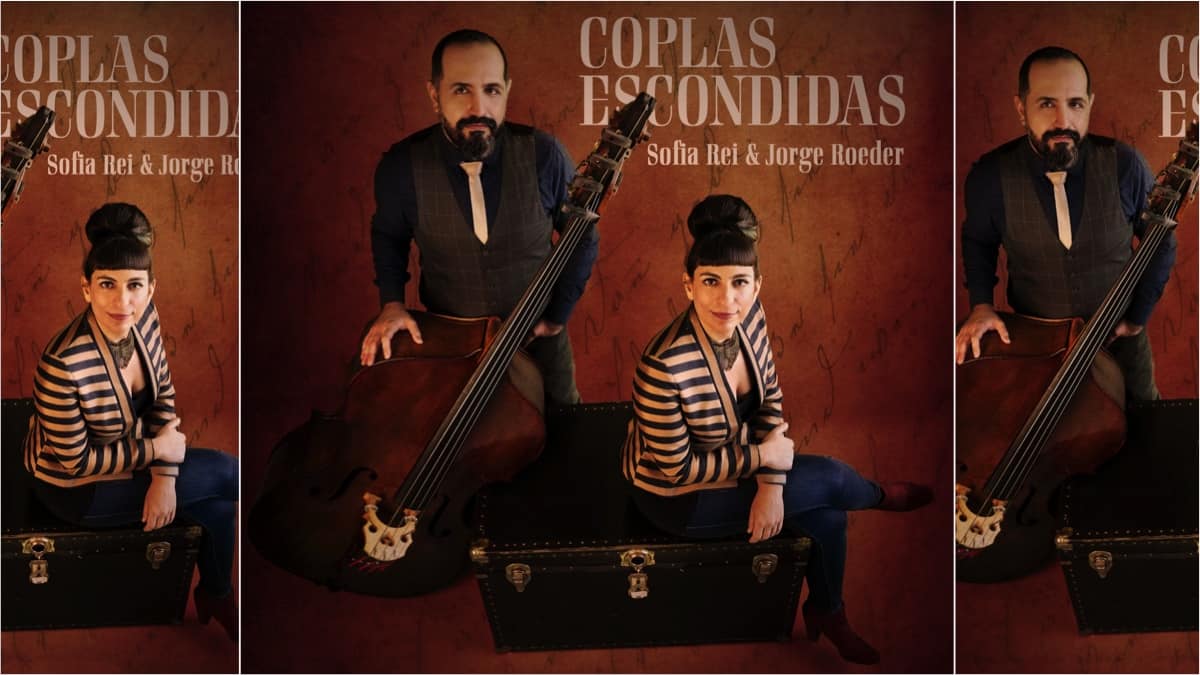
Coplas Escondidas…
Neither folkloric nor avant-garde, straight ahead or Latin jazz, Coplas Escondidas is a singular creation by Argentine-born vocalist Sofia Rei and Peruvian-reared bassist Jorge Roeder, two of the foremost cosmopolitan improvisers on the international jazz scene. Slated for release on Friday, August 25, 2023, the duo project celebrates the depth of Latin American song forms, and it’s wonderfully original — unlike anything in their varied discographies.
Seizing a moment afforded by the pandemic shutdown, Rei and Roeder met up in Brooklyn at Mark Goodell’s studio for a musical communion drawing on two decades of oft-intersecting exploration. Coplas Escondidas continues a creatively charged musical conversation between two longtime friends and intermittent collaborators who’ve been influencing and inspiring one another since they met two decades ago at New England Conservatory. The songs and rhythmic settings span South America, drawing on an array of styles and traditions interpreted through an improvisational jazz ethos.
A classically trained mezzo-soprano, Rei has earned numerous awards and widespread esteem with five albums under her own name, most recently 2021’s electronica-laced Umbral. But she’s equally hailed for her collaborations with masters such as Brazilian composer Clarice Assad, guitarist Marc Ribot, vocal wizard Bobby McFerrin, composer/arranger Maria Schneider, and, most prolifically, John Zorn, including 2018’s acclaimed, The Book Beri’ah: Keter, with JC Maillard. Born and raised in Buenos Aires and based in New York since 2005, Rei was singled out by the Boston Globe for “possessing a voluptuously full voice, comprehensive command of Latin American rhythms, and encyclopedic knowledge of folkloric forms from Argentina, Peru, Colombia, and Uruguay.”
Like Rei, Jorge Roeder is a conservatory-trained artist who was only 20 when the Lima Philharmonic and Opera orchestras appointed him assistant principal bassist in 2001 (while he also played electric bass with the Lima heavy metal band Ni Voz ni Voto). Since moving to the U.S. to study at NEC in 2002, he’s forged deep and lasting ties to several extraordinary artists, performing widely and recording with saxophonist/composer John Zorn, guitarist Julian Lage, Israeli-born pianist Shai Maestro, and trombonist Ryan Keberle. Among the busiest bassists in jazz, he’s also collaborated with vibes legend Gary Burton, guitarist Nels Cline, vocalist Thana Alexa, guitarist Brad Shepik, and saxophonist Dan Blake, among many others.
Coplas Escondidas— Featured Compositions
Coplas Escondidas extends a dialogue that started almost the moment Roeder and Rei met at NEC, where they were “two of just three Latin Americans in the entire program, so it was easy to make a first connection,” Rei recalls. “I invited him to a session to try songs, ideas and improvisations just the two of us. We felt a strong musical connection and kept playing together ever since.”
Both players contribute an original piece to the program, which also features two jazz standards, Thelonious Monk‘s “Ask Me Now” (lyric by Jon Hendricks) and Jimmy Rowles‘ “The Peacocks” (lyrics by Norma Winstone). A brief first take with no solos, the former dances on a precipice to a 5/8 Venezuelan merengue, distilling a tale of regret. “We always feel we are about to crash and fall into the abyss, but we tend to manage each time,” Rei says. “There is humor, regret, conflicted thoughts and feelings, all going at light speed.”
Over the past few decades “The Peacocks” has become a proving ground for jazz’s most adventurous vocalists, but even by that daunting standard there’s nothing quite like Rei and Roeder’s high wire act, which calls to mind legendary Sheila Jordan‘s early duo adventures with bassist Harvie S (then known as Swartz). “It’s hard enough for a vocalist to perform it with a fixed-intonation chordal instrument like a piano or guitar,” Roeder says, marveling at Rei’s navigational skills. “It’s a double layer of difficulty when the accompanying instrument is a double bass!”
Ruffling through the Latin American Songbook, they transform one gem after another. The songs often directly reflect and celebrate the lives of working people so often overlooked and neglected by governments. The classic Peruvian waltz “Callejón de un solo caño” (One-faucet Alley) by the Afro-Peruvian siblings Nicomedes and Victoria Santa Cruz captures the joyful camaraderie of an informal alley jam session, while Jorge Fandermole‘s “Oración del remanso” (Backwater Prayer) describes the hard life of fishermen on the Paraná river. It’s a graceful example of chamamé, a folk tradition from northeastern Argentina combining schottische and indigenous Guaraní influences.
“Since we were students in Boston we’ve always wanted to show our American and international peers and audiences that there was much more variety in musical styles in Latin America than what they had been exposed to,” Rei says. “In a way this record, even as a snapshot, fulfills that goal given the intimate, non-traditional setting in which we framed them.”
The duo draws generously from Argentina’s deep trove of anthems, from Eduardo Lagos‘s harmonically expansive chacarera “La Oncena” (The 11th) to Argentine poet and composer Maria Elena Walsh‘s “Serenata para la tierra de uno” (Serenade For One’s Own Land), a stirring song indelibly linked to Mercedes Sosa and resistance to military repression delivered with quiet passion by both Roeder and Rei. With every track offering a series of decisions each song contains surprising moments, like Roeder dropping away in the midst of “Gallo Camarón” (Feisty Rooster) by the great Peruvian poet, singer and composer Chabuca Granda, then coming back in with hand claps.
Two of Brazil’s foundational songwriters are represented by masterworks. The duo deliver an exquisite take on the heartbroken lament “Silencio De Um Minuto” (One Minute Silence) by the prolific but short-lived Noel Rosa (1910 – 1937), while Pixinguina “Rosa” retains its joyous bounce even as they subtly recast the Brazilian waltz into a Peruvian vals. “I fell in love with the melody of this song and realized how challenging it was when I learned it,” Rei says. “Then it became part of a series of technical exercises for my advanced students at Berklee.”
Both artists contribute deeply personal original pieces. An anxious, existential reflection on Roeder’s experience of lockdown in New York, “Días de Sitio” (Siege Days) generates delicious tension with Rei’s rising vocals soaring over his headlong, double time bass line, which he composed “as a direct consequence of having so much time to practice,” he says. And Rei’s “Prestados” (Borrowed) fulfills her longtime ambition to introduce tango into her repertoire. “The lyrics talk about a sense of exhaustion about political manipulation,” she says, offering her own reflection on our recent civic traumas.
In an encore to the Brooklyn session, Rei and Roeder met in Buenos Aires to record a live session with audio and video, capturing the essence of the project, live, intimate, free, and minimalistic. Working with Eric Dawidson’s production crew they recorded three songs from Coplas Escondidas at one of the city’s iconic recording studios, Romaphonic (formerly Circo Beat) in one-shoot takes. It’s an invaluable addition to a project that brings to fruition a seed planted on Rei’s debut album, 2006’s Ojalá, which included their duo performance on the Argentine chacarera “Alma del Pueblo.”
Fully exploring the potential of the duo setting, “there is trust,” Rei says. “There is freedom. There is enough space and silence. There is the possibility of hearing every nuance, every detail that both the bass and the voice are making.”
Sofia Rei and Jorge Roeder will celebrate the release of Coplas Escondidas at Joe’s Pub on Friday, August 25, 2023 >>> VIEW
Bass CDs
Reissue: Geddy Lee’s My Favourite Headache and Alex Lifeson’s Victor
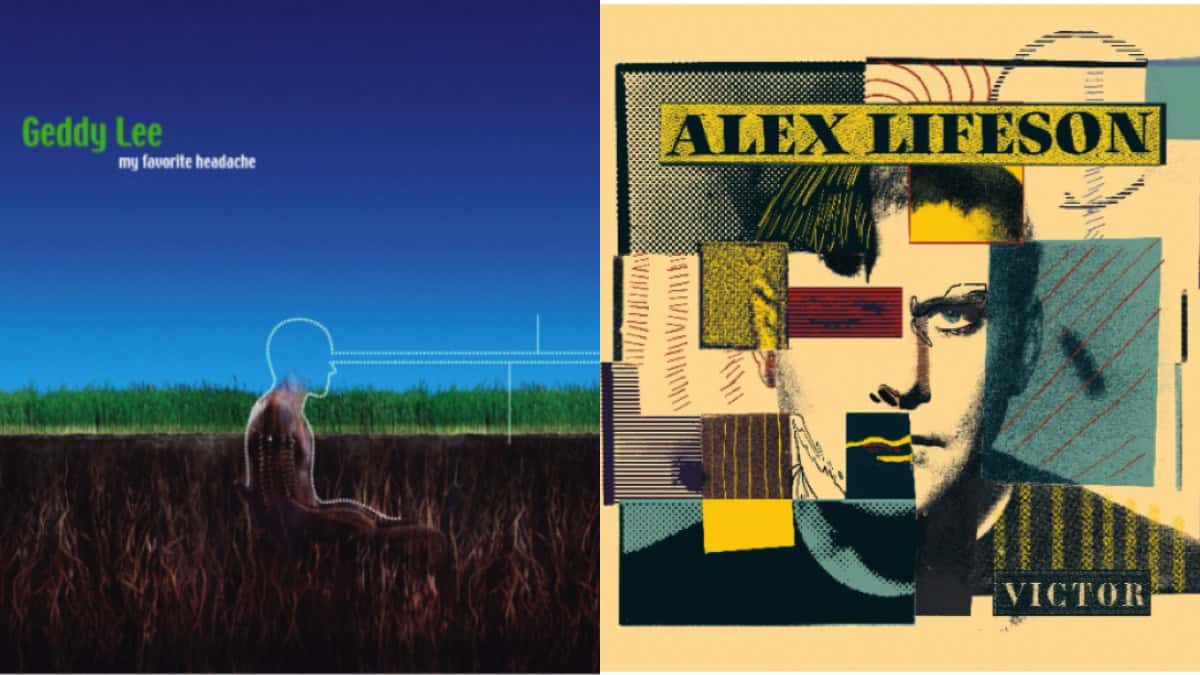
In an exciting announcement for Rush fans and rock enthusiasts alike, Anthem Records in Canada and Rhino Records will reissue the first-ever solo albums of Alex Lifeson and Geddy Lee. Lifeson’s 1996 album Victor and Lee’s 2000 offering My Favourite Headache will be re-released on August 9, 2024, in various formats, including a range of vinyl configurations.
My Favourite Headache, Geddy Lee’s only solo album to date, was initially released on November 14, 2000. This reissue marks its first vinyl pressing since a limited-edition Record Store Day exclusive in 2019. The fourth side of the album features two instrumental mixes. Produced by Lee, Ben Mink, and David Leonard, the album includes contributions from Mink and drummers Matt Cameron (Soundgarden/Pearl Jam) and Jeremy Taggart (Our Lady Peace).
Victor, originally released on January 9, 1996, marks Alex Lifeson’s solo debut. Lifeson took on the roles of songwriter, producer, and mixer for this album. For the first time, Victor will be available on vinyl, featuring a complete remix by Lifeson himself to enhance the audio quality. The fourth side of the album includes four instrumental tracks previously exclusive to Lifeson’s website. Guest artists include lead vocalist Edwin from I Mother Earth, Primus bassist Les Claypool, and Canadian powerhouse vocalist Lisa Dalbello. The 15-song collection is paired with striking 2024 reimagined artwork by Fantoons Animation Studios.
For more details on the Geddy Lee reissue and to preorder, https://lnk.to/MyFavouriteHeadache
For more details on the Alex Lifeson reissue and to preorder, https://lnk.to/AlexLifesonVictor
Bass CDs
New Album: Ben Wolfe, The Understated
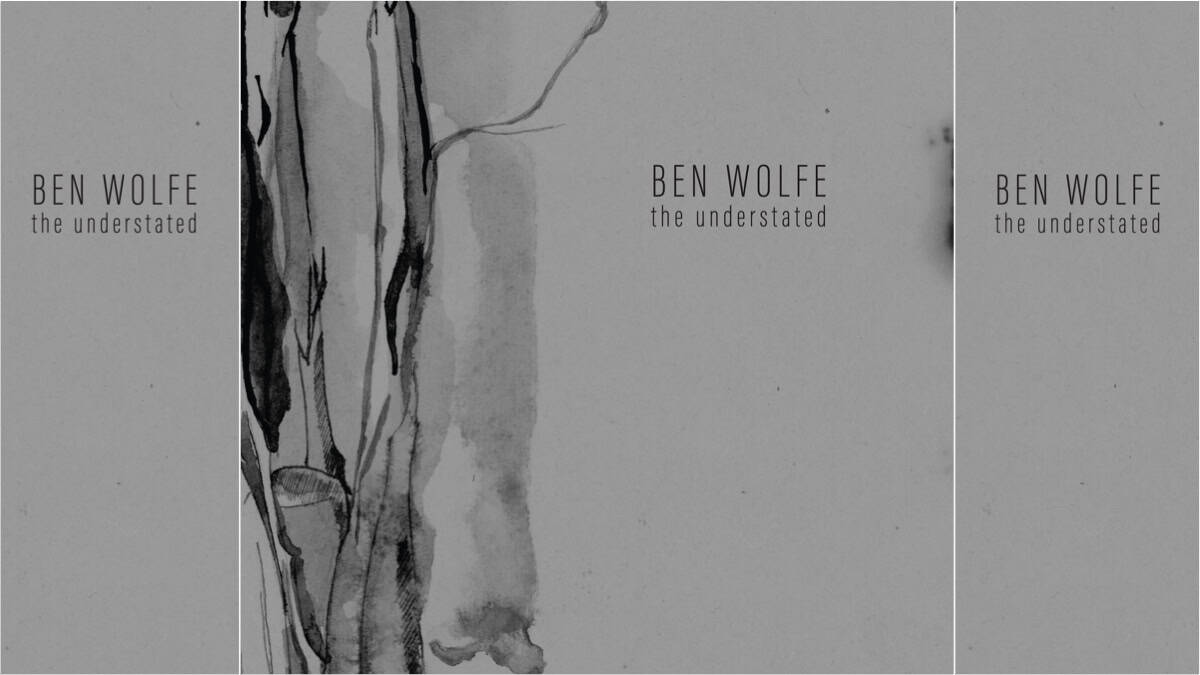
Acclaimed bassist and composer Ben Wolfe is thrilled to announce the August 9, 2024 release of The Understated.
This evocative new album features a collection of new original compositions by Wolfe paired, with re-imaginings of some of the composer’s classic material, with a particular emphasis on the ballad song-form. The album features ten tracks, five of which are ballads – a bold move for any composer – Wolfe creates a cohesive narrative here that challenges the listeners perception of the classic ballad. The Understated features Wolfe alongside artists who make up the very frontline of modern jazz, including pianist Orrin Evans, tenor saxophonist Nicole Glover, drummer Aaron Kimmel, guitarist Russell Malone and pianist Sullivan Fortner.
Wolfe has always been drawn to finding beauty in subtlety. He perceives a certain tranquility and elegance in the Coltrane Quartet, Louis Armstrong’s Hot Fives and Sevens, the legendary Miles Davis bands and rhythm sections, and the music of Charlie Parker. While he, of course, revels at the immense world-building energy of this music, it’s the “other side” – the elusive, magical aspect that endlessly captivates him – the understated. The composer draws inspiration most from the ensemble work of these hallmark jazz ensembles. Despite the individual parts being extraordinarily beautiful on their own, the musicians in these archetypal ensembles play only what is needed to serve the music, paying particular attention to the band-sound more-so than their individual sound. The Understated embodies this ethos with a tremendously impactful ensemble-oriented approach.
Wolfe sought to continue the thread started by “Lullaby in D” from his previous critically acclaimed release Unjust. Wolfe indicates, “Something about that take was so perfect to me. It had been brought to life, and it had that ensemble thing.” Wolfe assembled the quartet who recorded “Lullaby” (including longtime collaborator Orrin Evans, as well as recent frequent collaborators Aaron Kimmel and Nicole Glover) and two very special guests, Russell Malone and Sullivan Fortner. The recording process took place in one room with no headphones or isolation booths, further emphasizing the group’s collective awareness.
This record succeeds in bringing Wolfe’s expansive music to life through extremely conscientious group playing. Nothing is forced or pushed; everything that needs to be stated is stated. The single from the album, “Waltz,” encapsulates the spirit of the project. Wolfe says, “I view albums like a complete painting, so singles have been difficult for me. This song is very much in the spirit of the whole but doesn’t give away the record.” The piece features a sentimental melody delivered with grace by tenor saxophonist Nicole Glover, before Glover and Evans embark on stirring solos dancing in and out of the tune’s harmony.
Other new original compositions featured here include “Ballad in B”, which perhaps best demonstrates the group’s stunning cohesion. This tune is a refreshing diversion as it features a serene repeated melody without overt melodic improvisation. The following track, “Anagram”, begins with Kimmel’s rhythmic refrains and a unison melody played by Glover and Wolfe and is a true ensemble piece. On this track, Wolfe shines with a lyrical solo. The moody short interlude “So Indeed” is a lyrical masterwork that leaves the listener wanting even more. “Beautiful You” features master guitarist Russell Malone on the track’s melody. The emphasis here on restrained lyricism is a prime reminder of the old adage “it’s not the notes you play, it’s the notes you don’t play”. Each pocket of space in between melodic moments leaves room for the listener to breathe deeper and deeper into the song. The driving “Triangle Man” features fantastic improvisation from Glover and Kimmel. The tender “Barely Spoken” concludes the album with a feature for pianist Sullivan Fortner.
The album also weaves in references to Wolfe’s past works, creating a personal musical universe. “The Poet Speaks” is the opening track on his first record, 13 Sketches. “Occam’s Razor” was composed years ago for a collaboration with a choreographer and painter, and was a much different composition in its original form. “Love Is Near” was originally found on The Whisperer. With ballads in particular, Ben uses voicings and sounds that represent certain things to him, intentionally referencing his other compositions to generate connections between his songs.
Wolfe’s tremendous compositions on this album are also influenced by the group of musicians that he assembled for this release. Wolfe remarks “One of the things these five musicians share in common is that not only are they true ensemble players, they will always play something unexpected and special.” Listeners will find calm and beauty within the ensemble performances throughout The Understated.
Visit online at benwolfe.com/
Bass CDs
New Album: Orlando le Fleming, Wandering Talk
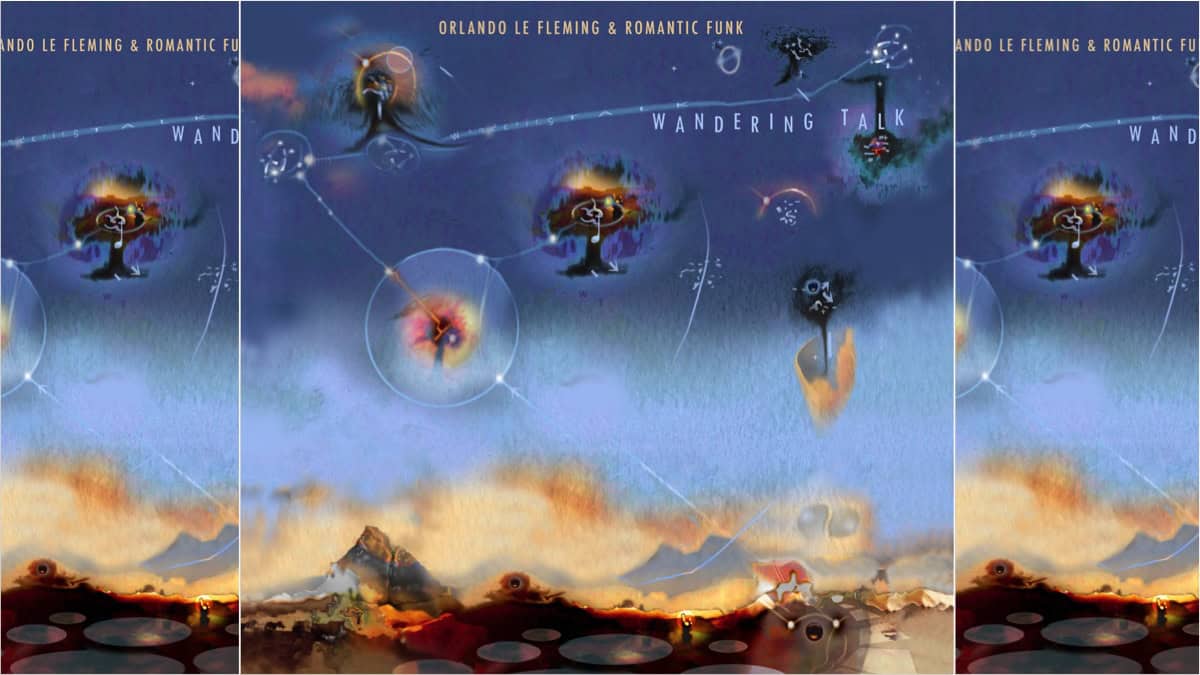
Bassist, band leader, and composer Orlando le Fleming continues to make music that crosses genres as readily as he crosses the Atlantic, with this new album ‘Wandering Talk’, to be released physically on 23rd August via the UK’s premiere jazz label, Whirlwind Recordings.
After 20 years in New York City, he’s back in his native UK, forging new pathways and renewing old partnerships. His love for the acoustic tradition continues unabated alongside his deep affection for the robust, muscular electric fusion that emerged in the 1980s, and he has received critical acclaim from media including The Guardian, Financial Times, Jazzwise, and All About Jazz among others. He has also toured and recorded with some of the world’s greatest jazz musicians including Branford Marsalis, Kurt Rosenwinkel, Antonio Sanchez, Ari Hoenig, and Wayne Krantz.
The Romantic Funk project was born in New York’s legendary 55 Bar to explore that legacy: now the new album ‘Wandering Talk’ builds on the critical acclaim generated by ‘The Unfamiliar’ (2020), building on the framework with a set of collaborators that brings together London and New York, past and present, acoustic, and electric, and merges it all into a spectacular whole.
Following the same principles that served the project in NYC, le Fleming booked four Friday nights at London’s renowned Vortex Club to workshop the music that would become the album, with a rotating cast of players which he honed down into the final line-up. Old London friends Tom Cawley (piano/keys) and James Maddren (drums) completed the rhythm section. New acquaintance Nathaniel Facey was picked from the ranks of the UK’s brightest young saxophone players. NYC stalwart Philip Dizack flew in from the US to play trumpet and reaching back to Orlando’s school days and forward to his own family, one-time classmate Chris Martin (Coldplay) and his own daughter Nadia combined to provide vocals on a special setting of Rumi’s poetry.
As before, the music combines fusion’s flash and fire with a contemporary sensibility. This time, Orlando’s questing spirit sends his superb band forward to investigate fresh areas of creativity in dynamic and texture.
Visit online at orlandolefleming.com
Bass CDs
Album: John Entwistle, Rarities Oxhumed – Volume Two
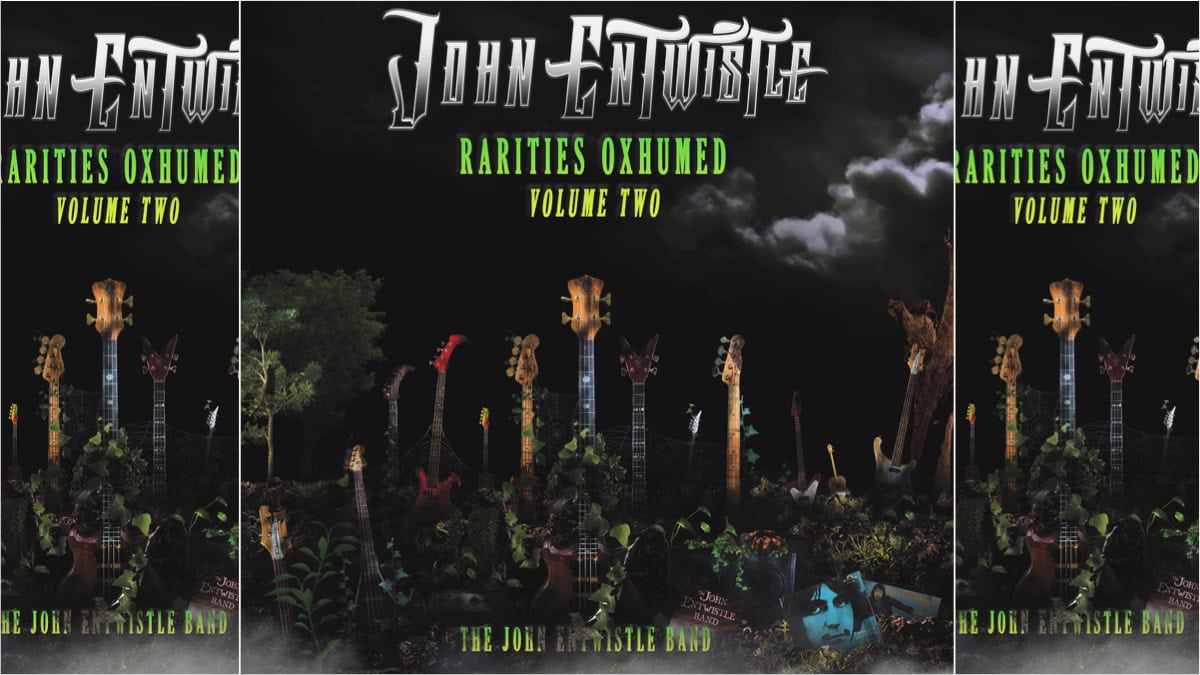
Album: John Entwistle, Rarities Oxhumed – Volume Two
Rarities Oxhumed – Volume Two is the second of the series of posthumous releases coming from John Entwistle.
Rarities Oxhumed – Volume Two is a compilation that was curated by drummer Steve Luongo, who served as John Entwistle’s producer, bandmate, business partner and good friend for many years. As Luongo states, “When I agreed to do two volumes of John Entwistle rarities, I knew volume two had to be even better than volume one. It is!” The collection of songs on Volume Two are from his years with the John Entwistle Band and include re-mastered versions of studio tracks including “Endless Vacation”, alternate mixes of tracks like “Sometimes”, and live tracks including The Who cuts “Real Me”, “Long Live Rock” and an epic version of “Young Man Blues”. The latest preview track to be released is the Who cut “Had Enough.”
Listen to “Had Enough” here: push.fm/ps/hadenough
Rarities Oxhumed – Volume One was quickly embraced by longtime fans as it featured gems like “Bogey Man” featuring Keith Moon, “Where You Going Now” (demo for the Who), and a raw live version of “Trick of the Light” recorded during the John Entwistle Band’s final tour in 2001. Deko Entertainment is thrilled to have been able to bring both volumes of this unearthed music of John Entwistle to the fans and forever solidify him as one of the greatest rock musicians ever.
For more information, visit online at dekoentertainment.com/john-entwistle
Bass CDs
Album Review: Mark Egan, Cross Currents
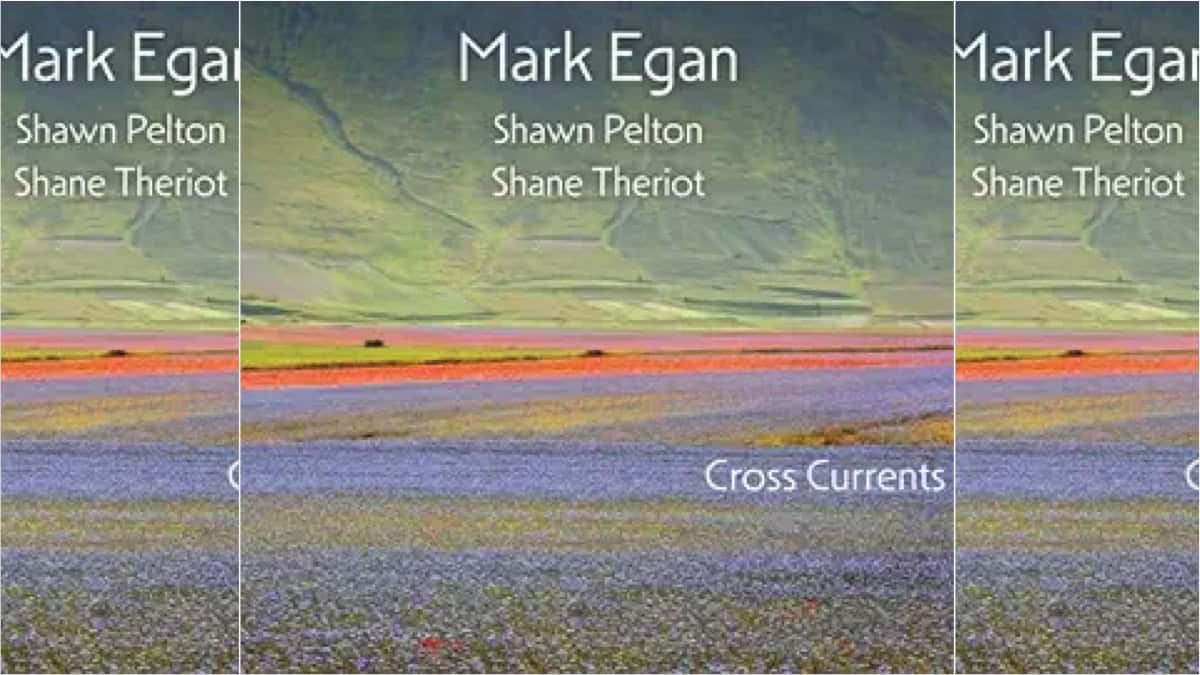
Mark Egan, Cross Currents…
It is exciting every time I get a new album from Mark Egan as he is such an amazingly versatile player and I never know what to expect (except for excellent artistry!) In his latest release, Mark has teamed up with Shawn Peyton on drums and Shane Theriot on guitar to bring us “Cross Currents”.
This collection of eleven tracks transports me to the Gulf Coast (New Orleans specifically). Mark’s fretless basses lay down a solid groove and lots of juicy solo work for this rootsy collection of funk, ambient, swamp-rock, second line, ballads, Cajun and even Indian Raga.
This trio is super-tight and the musicianship is flawless as each member has ample opportunity to shine. Even though each player is very talented in their own right, I feel that the collective energy is greater than just the sum of the players on this album. Each musician contributed to composing music for this project but the lion’s share are Mark’s original pieces.
I spent the summer of 1981 in New Orleans and this wonderful music takes me back to those fond memories. I participated in a wacky raft race on Lake Ponchatrain and this opening track elicits images of fun, sunshine, music, and great food.
This is another superb album that everyone will enjoy. Get your copy today! Cross Currents is available online at Amazon.com. Visit Mark online at markegan.com.





















